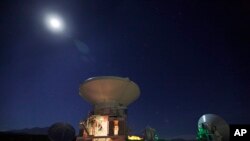Scientists hoping to see 13 billion light years away, giving them a look into the early years of the universe, are facing opposition from Native Hawaiian groups who say the construction site of a new telescope is on sacred land.
Police arrested 12 protesters Thursday when they tried to block the road leading to the summit of Mauana Kea on Hawaii's Big Island. Officers with the Hawaii Department of Land and Natural Resources arrested 11 protesters at the construction site on the summit.
Native Hawaiians believe the site where the telescope is being assembled is sacred because it is where their creation story begins, said Kealoha Pisciotta, an opponent of the telescope project.
"It is the burial grounds of some of our most sacred and revered ancestors," Pisciotta said. "It is a place where we go for sanctuary and release from the world around us, and it is also the home of our god."
All of the highest points in the islands are considered the home of deities, she said.
While the Native Hawaiian groups opposing the project do not oppose the telescope itself, they disagree with the location of the construction on Mauna Kea, the highest point in the state.
Scientists revere the site for another reason. They believe it's an ideal location for one of the world's largest telescopes because of the site's remote and sheltered position, nestled in the crater of a dormant volcano.
On Thursday, about 300 protesters, whom Pisciotta called "protectors," were on the mountain. Pisciotta wasn't there, but she said she was in contact with the protesters.
The people arrested Thursday were trying to block trucks heading to the peak, Pisciotta said. After the vehicles were allowed to pass, about 40 to 50 people began following the trucks, which moved slowly because of their heavy loads, she said.
Work got underway after protesters were arrested and their path was cleared to the summit, Sandra Dawson, a spokeswoman for the project, said in an email to The Associated Press.
Police said they warned protesters after an incident Monday that anyone who blocked the road would be arrested. Those arrested were released after they each posted $250 bail.
"We regret that police action had to be taken to enable our legal access to the project site," Thirty Meter Telescope project manager Gary Sanders said in a statement.
Opponents, who question whether land appraisals were done correctly, and whether Native Hawaiian groups had been consulted, have tried to prevent the construction of the $1.4 billion telescope.
Protests also disrupted a groundbreaking and Hawaiian blessing ceremony last year, but no one was arrested. In fact, some protesters who yelled during the ceremony later apologized to event organizers and helped put away chairs, Pisciotta said.
"We said aloha to each other, and we hugged," she said.
University of Hawaii spokesman Dan Meisenzahl said in a telephone interview that the university is saddened about the arrests, but that access to site must be maintained.
"If the university had a heart, it would be broken right now," he said about Thursday's arrests. However, "we have to make sure the road is safe for whoever wants to be there."
"The university sub-leases the land atop Mauna Kea for the telescope project, and it has always maintained that protesters would have free access to the site as long as they were not breaking any laws, he said. Meisenzahl said he was not certain why the arrests were made.
The observatory is expected to be operational by 2024, the same year a 39-meter telescope is expected to be completed in Chile.




